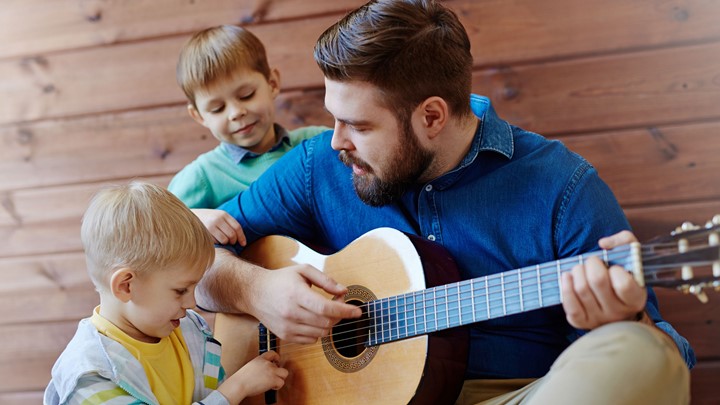Hearing loss in children
How the doctor detects and treats it
hearing loss
Hearing loss in children is not as rare as people think. If the problem is not diagnosed in time by an ENT doctor, the child may not develop properly in speech and social behaviour. It is therefore extremely important that parents recognise hearing disorders in children as early as possible.

Hearing loss in children can lead to developmental disorders
Hearing disorders in children can impair the development of speech comprehension, language and social skills.
The earlier hearing-impaired children are treated by a doctor, the more likely they are to develop their full potential later on.
There are special hearing tests for young children as well as hearing tests for older children that can detect hearing loss in children.
If a child is suspected of having hearing loss, a specialist should be consulted as soon as possible.
How common hearing loss is in children
About 1.5 out of every 1,000 newborn children suffer from hearing loss. In the age group of three to 17 years, it is already about five out of 1,000. The proportion of hearing-impaired children and adolescents in industrialised countries is increasing due to the omnipresence of noise.
In children, healthy, good hearing is essential for the development of speech, for learning and for the formation of social behaviour.
In the past, hearing loss in children only became apparent at around two years of age, when the child did not want to speak. Nowadays, hearing tests can detect and treat hearing loss in young children at an earlier age. Hospitals perform the first hearing tests on babies (called newborn hearing screening) as early as 24 to 48 hours after birth as part of U1. If a baby does not pass these tests, a second hearing test follows a few weeks later. This leads to much better therapeutic results than if hearing loss in children is detected later.
Hearing tests in infants
However, some children still develop hearing problems later, even though they have passed the first hearing test.
ENT head physician Prof. Dr. med. Hans Behrbohm from the Park-Klinik Weißensee in Berlin recommends:

ENT chief physician
"Babies should be closely observed by their parents during the first weeks of life. The earlier a suspicion of deafness or hearing loss is investigated, the better the chances of rehabilitation. Congenital deafness also leads to a lack of language development in the child. A sure sign is when, from the 4th to the 6th week, there is no sign of the infant being startled by loud noises, or when the child does not turn its eyes towards a loud sound source."
Important developmental steps as indicators for infant hearing loss
The Federal Centre for Health Education has listed at what age a toddler should react to acoustic stimuli and how:
After birth
Your child should:
- be startled by sudden loud noises.
At about 3 to 5 weeks
Your child should:
-
respond to encouragement
-
listen when you make a sound at a distance of about 20 centimetres, for example by snapping your fingers
-
listen attentively to voices and sounds when it is rested
-
look with the eyes for the source of familiar sounds
-
make occasional sounds
At 2 to 3 months
Your child should:
-
be soothed by a familiar voice even without eye contact
-
move their head in the direction of a sound source
-
laugh audibly
At 5 to 6 months
Your child should:
-
draw attention to himself with his voice
-
respond to distant sounds, such as a doorbell
-
show restlessness through unfamiliar noises
At 1 year
Your child should:
-
respond to whispered speech from about a metre away
-
look for the source of the noise when listening to music, for example
-
understand commands such as "No
-
babble contentedly when alone in a room.
Hearing tests for children over the age of two
Older children can also have hearing loss that is temporary or permanent. A possible hearing loss is more difficult to identify in older children whose speech is already developed.
Prof. Dr. Behrbohm on the causes and typical complaints: "In children between two and six years of age, there are often ventilation problems in the middle ear. The cause is enlarged pharyngeal tonsils, also called adenoids. They obstruct the eustachian tube and cause effusions in the middle ear. The children snore at night, breathe through their mouths and only respond when spoken to loudly. There is also a delay in speech development. In addition, the children speak slurred."
Signs that a child over the age of two may have a hearing disorder:
- Your child often says that he did not hear you. It often answers with a counter-question like "what?" or reacts inappropriately when you address it. This indication seems trivial, but many parents assume in such cases that their child is not attentive enough. They do not suspect that he or she might be suffering from a hearing disorder.
- Your child seems to hear well, but sometimes fails to respond in a noticeable way.
- Your child looks at you intensely while you are talking to him as if he needs to concentrate. It may depend on visual cues to understand you.
- Your child turns up the volume on the TV louder than other family members.
- Your child starts talking louder than usual.
- Your child frequently turns one ear to the sound sources when listening, claiming that he or she can only hear well with that ear.
- Your child's grades worsen or the teacher notices that the child hears or responds differently than his/her classmates.
- Your child complains of ear pain or ringing in the ears.
If you suspect that your child has poor hearing, you should definitely take him or her to the family doctor as soon as possible. If necessary, he or she will refer the child to a paediatric specialist or ear, nose and throat specialist. Only a specialist can determine the causes of the hearing loss and initiate appropriate therapy.
Hearing loss in children - treatment by the doctor
The specialist will first carry out a hearing test especially for infants or children. These tests are painless and non-invasive; only external measurements are taken.
Depending on how severe the child's hearing loss is and what causes it, various therapeutic measures may be considered:
-
Remedy of the cause (earwax, injury).
-
Medication (infection)
-
Operative intervention
-
Hearing aid
-
Cochlear implant
-
Combination of speech therapy and hearing aid
Nowadays, hearing loss in children can be treated very well by a specialist, so that affected children are not disturbed in their development and hindered in their social activities.
Special hearing aids can also be a valuable help for children.
Discover other articles
- Smart Hearing: What intelligent hearing systems do
- The sooner an ENT specialist is consulted, the better
- Comfort to go: KINDvitalo
- Hearing loss and its causes
- Hearing aids while driving
- Optimized design for hearing solutions
- Meniere's disease
- Hearing test: Procedure and result
- Loud alone is not enough:
- Noise protection for the ears